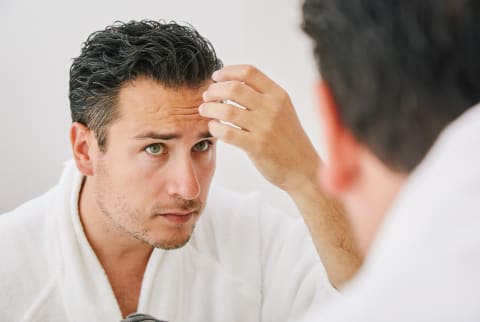Advertisement
Sugar-Sweetened Beverages Have Been Linked To Hair Loss—What You Should Know


Losing your hair can take a toll on your mental health, no matter the specific cause. While general aging and hormonal shifts are common triggers (plus stress, which can totally lead to hair loss), there's more to shedding than meets the eye—for some, diet plays a significant role.
Packing your plate with whole, balanced foods when possible is generally the directive for staying healthy and supporting hair growth.
However, one study reveals one specific type of beverage linked to hair loss—here's what you should know.
The link between sugar-sweetened beverages & hair loss
Numerous studies have indicated the negative effect of the Western diet on male pattern hair loss (MPHL); one study even found the Mediterranean diet (which many argue is the opposite of the standard American diet) can help decrease MPLH1.
One common staple in the Western diet? Sugar-sweetened beverages. In the U.S., 49% of adults drink a sugar-sweetened beverage on a given day, according to a 2014 study.
Sugar-sweetened beverages don't just include soda and soft drinks—juice with added sugar, sports drinks, energy drinks, sweet milk, sweet tea, and sugar-packed coffee fall into this category as well.
To further study the potential link between these drinks and hair loss, researchers from Tsinghua University in Beijing surveyed 1,000 men who drank between 1 and 3 liters of sweetened drinks each week.
The results: Those who consumed more than one sweetened drink each day were at a 42% greater risk of experiencing hair loss, compared to those who did not. Researchers specifically identified artificially sweetened nut milk and pure fruit juice as potential risk factors for MPHL.
The study also acknowledged that heightened anxiety may also contribute to accelerated hair loss (something that has been linked to female pattern hair loss as well).
Side note—yes, this study was only done on men, but that's not to say there is no link between sugar-sweetened beverages and hair loss in women. That research just hasn't been conducted quite yet (perhaps this calls for a follow-up study?).
What you can do
All of this to say: If you're one to order a sugary vanilla latte at the coffee shop or have a few glasses of artificially sweetened fruit juice daily, you may want to consider swapping out your go-to beverage for something naturally sweet instead.
This doesn't mean you can't treat yourself to a sweet drink every once in a while; however, the daily habit may be something to reconsider if you're concerned about hair loss (or managing blood sugar levels in general).
What's more, consuming more fresh herbs, vegetables, and other staples in the Mediterranean diet may decrease the risk of hair loss as well1.
We should note that there are plenty of other factors to consider when preventing hair loss, including adequate sleep, managing stress levels, and hormonal balance. Again, everyone's triggers are different—diet just may play a bigger role for some than others.
Want to take it a step further? Consider adding a hair vitamin to your routine and using a hair growth serum daily to further prevent the risk of hair loss and contribute to stronger, more resilient strands.
Need recs? Start here, with our curated list of the best hair, skin, and nail supplements and best hair growth products for men and women.
The takeaway
Treating hair loss can feel like an uphill battle, but it's important to collect the facts on contributing factors. Research demonstrates a link between daily consumption of sugar-sweetened beverages and hair loss in men, so consider swapping your daily drink for something with natural ingredients.
Here's a list of natural sweeteners and sugar alternatives, if you're looking to jazz up your daily beverage.











